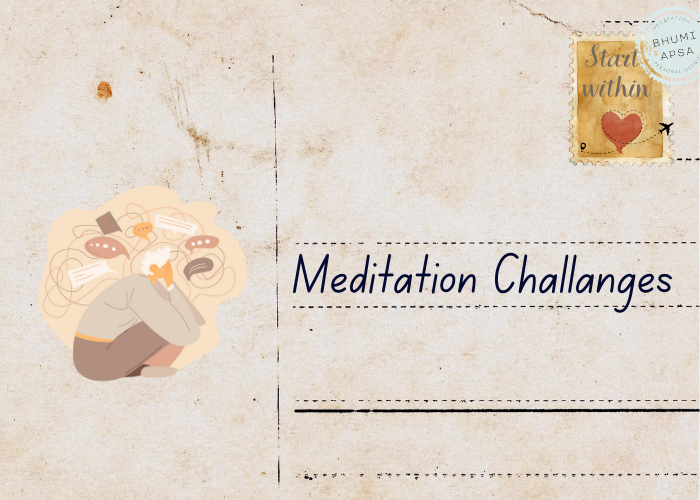Common Meditation Challenges and How to Overcome Them
Introduction:
When I first started meditating, I faced many of the same challenges you might be experiencing. I didn’t dive into hour-long sessions right away; I began with just 5 minutes a day. It was difficult at first, and my mind often felt like a whirlwind of thoughts. But with time and patience, meditation became a rewarding practice that I gradually extended. If you’re struggling with meditation, you’re not alone. In this post, we’ll explore common meditation challenges and practical strategies to overcome them.
1. Struggling with Thoughts:
It’s natural to experience a flurry of thoughts as soon as you close your eyes. You might feel frustrated, thinking you’re not meditating correctly because your mind is racing.
Solution: Understand that having thoughts during meditation is part of the process. The goal isn’t to eliminate thoughts but to gently guide your focus back to your breath or mantra each time you notice your mind wandering. This practice helps train your brain to stay present and aware. According to research on neuroplasticity, meditation helps in rewiring the brain, enhancing our ability to maintain focus and awareness.
2. Finding Time to Meditate:
In a busy life, carving out time for meditation can seem impossible. You might struggle to fit even a few minutes into your day.
Solution: Start with a commitment to just 5 minutes a day. This small, manageable goal makes it easier to build a consistent habit. As you start to experience the benefits of meditation, you’ll likely want to extend your sessions. Consistency is key, and even short, daily practice can be highly effective.
3. Physical Discomfort:
You may find it challenging to sit comfortably for meditation, especially if you’re not accustomed to sitting still.
Solution: Choose a position that is comfortable for you. There’s no need to force yourself into a lotus position if it doesn’t feel right. Sit with your back straight and your body relaxed. The focus should be on the practice, not on discomfort. If necessary, use a cushion or chair to support your posture.
4. Lack of Motivation:
Maintaining motivation can be tough, especially on days when you feel too busy or disinterested in meditating.
Solution: Establish a daily routine with a specific time for meditation. Set a goal to meditate for just 5 minutes each day, and remind yourself of the benefits. Having a clear intention for your practice can help keep you motivated. On challenging days, simply showing up and doing your best is a success.
5. Resistance to the Practice:
Even though you know meditation is beneficial, you might still resist the practice. This could be due to discomfort, impatience, or other internal barriers.
Solution: Acknowledge that resistance is a normal part of meditation. Be kind to yourself and recognize that meditation is about practice, not perfection. Embrace the journey and accept that some days will be easier than others. Building the habit and developing determination is part of the process.
6. Understanding Neuroplasticity:
It’s important to understand that meditation is more than just a mental exercise; it’s a practice that influences the brain’s wiring. Neuroplasticity research shows that regular meditation helps in forming new neural connections and improving mental clarity. This means that over time, your brain becomes better at staying focused and managing stress.
Solution: Keep in mind that meditation is a training ground for your brain. By practicing regularly, you’re actively reshaping your neural pathways. Embrace this idea and use it as motivation to persist through the initial difficulties.
7. Choosing the Right Technique:
Beginners might find it challenging to pick a meditation technique that suits them. With so many options available, it can be overwhelming.
Solution: Start with a technique that resonates with you. For many beginners, mantra meditation is helpful because it provides a focal point for the mind, making it easier to concentrate. Experiment with different methods and see what works best for you. It’s perfectly fine to explore and adjust your practice as needed.
8. Developing Consistency:
Consistency is one of the biggest challenges in establishing a meditation practice. You might find it hard to stick to your routine, especially when traveling or dealing with a busy schedule.
Solution: Develop a habit by committing to meditate every day, even if it’s just for a few minutes. Consider setting reminders or using a meditation app to keep track of your practice. When traveling, adapt your practice to fit your circumstances—sometimes a short, mindful moment is all you need.
Conclusion:
Meditation is a journey, and it’s perfectly normal to encounter challenges along the way. By starting with small, manageable goals and being kind to yourself, you can build a sustainable and rewarding practice. Remember, the goal isn’t to achieve perfection but to gradually cultivate awareness and presence in your daily life.
What’s next:
If you’re looking for more guidance on developing a meditation habit, check out our Developing the Habit of Meditation class or download our free PDF guide on establishing a consistent practice. For more insights and support, don’t forget to listen to our latest podcast episode on mindfulness and meditation with Thich Nhat Hanh.
Embrace the practice, be patient with yourself, and enjoy the journey!

